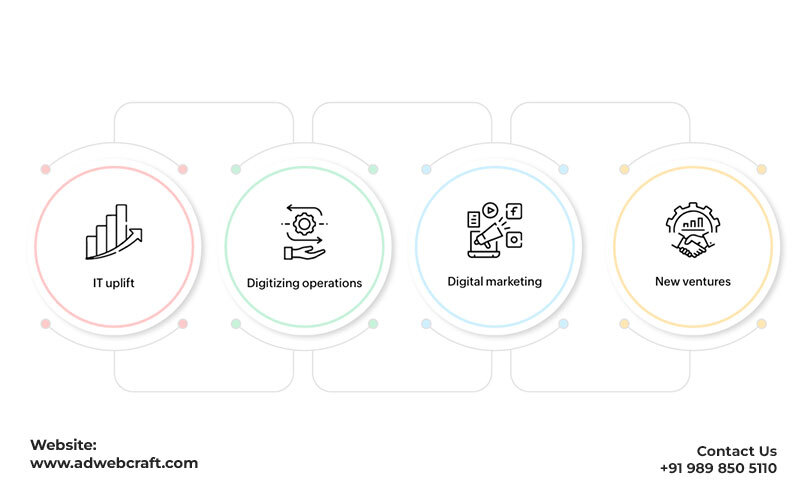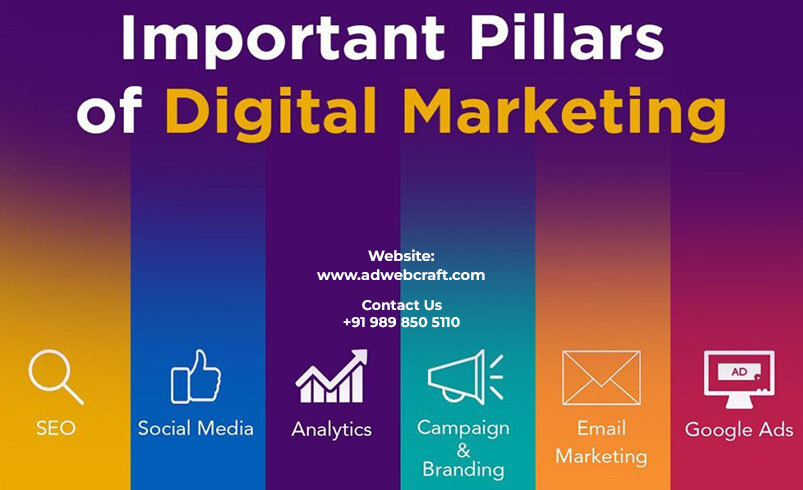Digital marketing is the cornerstone of modern business success, offering tools and strategies to reach wider audiences and foster meaningful connections. To excel in the competitive online landscape, it’s essential to understand the pillars of digital marketing exist and how they work cohesively. This guide delves deep into these pillars, answering pressing questions and providing actionable insights to help businesses create impactful online strategies.
What are the Main Pillars of Digital Marketing?
The pillars of digital marketing are foundational principles that support an effective marketing strategy. These encompass various techniques and channels designed to promote products, engage audiences, and drive conversions. But how many main pillars of digital marketing are there? Understanding these pillars such as content marketing, social media, SEO, email marketing, and paid advertising is crucial for building a comprehensive and adaptable strategy.

Search Engine Optimization (SEO)
SEO focuses on optimizing a website to rank higher in search engine results pages (SERPs). It involves on-page factors like keyword usage and meta descriptions, alongside off-page tactics such as backlink building. The goal is to increase organic traffic by making your content more discoverable and relevant to search queries. As businesses compete for visibility, SEO becomes a vital component of their marketing framework.
Content Marketing
Content marketing revolves around creating and distributing valuable, relevant content to attract and engage a specific audience. Blogs, videos, infographics, and e-books are popular formats. By addressing the pain points of your target audience, content marketing establishes your brand as an authority, fostering trust and loyalty.
Social Media Marketing (SMM)
Social media platforms offer unparalleled opportunities to connect with audiences. By sharing engaging content, running targeted ads, and leveraging analytics, businesses can amplify their reach and build strong relationships. Whether through Instagram Reels or LinkedIn posts, social media marketing is a dynamic and interactive pillar.
Pay-Per-Click Advertising (PPC)
PPC allows businesses to drive traffic quickly by paying for ad placements. Google Ads and social media ad platforms enable precise targeting based on demographics, interests, and behavior. While results are instant, a strategic approach is necessary to ensure a strong return on investment (ROI).
Email Marketing
Email marketing nurtures relationships with leads and customers through personalized communication. Campaigns can include newsletters, promotional offers, or re-engagement messages. Automation tools streamline the process, ensuring timely and relevant messages reach your audience.
Affiliate Marketing
Affiliate marketing involves partnering with influencers or affiliate websites that promote your products in exchange for a commission. This approach extends your reach and credibility by leveraging the trust built by affiliates with their audiences.
Analytics and Data Insights
A successful strategy relies on data to measure and optimize performance. Tools like Google Analytics and social media insights provide actionable information about user behavior, campaign effectiveness, and areas for improvement. Data-driven decision-making ensures every marketing effort aligns with business goals.
What is the Best Digital Marketing Strategy?
The best digital marketing strategy depends on a company’s goals, target audience, and industry. Knowing how to create the best digital marketing strategies involves a balanced approach that incorporates all seven pillars for maximum effectiveness. For instance, combining SEO and content marketing can drive organic traffic, while PPC ensures immediate visibility. Social media marketing fosters engagement, and email campaigns nurture leads. Ultimately, the best strategy is one that is data-driven, flexible, and tailored to meet specific business objectives.
Why Businesses Need Digital Marketing?
With consumers increasingly relying on the internet for shopping, research, and entertainment, digital marketing has become an essential strategy for reaching and engaging with a wider audience. Here’s why the pillars of digital marketing are fundamental for any business:
Global Reach
One of the key pillars of digital marketing is the ability to reach a global audience. Digital platforms break down geographical barriers, allowing businesses to target customers around the world without incurring substantial additional costs.
Cost-Effectiveness
Another pillar that stands out is the cost-effectiveness of digital marketing. Unlike traditional methods, which can be expensive, digital marketing offers more affordable options for businesses of all sizes, ensuring that even small businesses can compete.
Targeted Campaigns
A significant advantage of the pillars of digital marketing is the precision it offers in targeting specific demographics. With advanced tools and data analytics, businesses can create highly targeted campaigns, ensuring they reach the right audience with the right message at the right time.
Measurable Results
Digital marketing is driven by data, making it easier to measure the effectiveness of your campaigns. Through analytics tools, businesses can track campaign performance in real-time, allowing them to make adjustments for optimal results and better return on investment.
Enhanced Engagement
The pillars of digital marketing also focus on fostering stronger customer relationships. Interactive platforms like social media allow for real-time communication, making it easier for businesses to engage with their customers and build lasting connections.
By embracing these core pillars of digital marketing, businesses can not only stay competitive, but also adapt quickly to evolving market trends and sustain long-term growth.

Frequently Asked Questions
1. What are the 4 pillars of digital?
A. The four pillars of digital often refer to foundational principles that underpin digital transformation. These include:
- Customer Experience: Prioritizing seamless and engaging customer interactions across digital platforms.
- Data and Analytics: Leveraging data to inform decisions and personalize experiences.
- Technology: Utilizing cutting-edge tools to streamline operations and enhance marketing efforts.
- Digital Marketing Strategy: Implementing comprehensive plans to promote products and build brand visibility.
2. What are the 5 pillars of the marketing concept?
A. The five pillars of the marketing concept emphasize a customer-centric approach:
- Customer Orientation: Understanding and fulfilling customer needs.
- Integrated Marketing: Ensuring all marketing efforts align cohesively.
- Profitability: Balancing customer satisfaction with business profitability.
- Customer Satisfaction: Building trust and loyalty through consistent value delivery.
- Social Responsibility: Addressing societal expectations and contributing positively.
3. What are the 5 P’s of digital marketing?
A. The 5 P’s of digital marketing are:
- Product: The value proposition offered to customers.
- Price: Pricing strategies that appeal to the target audience.
- Place: Online platforms and channels where the product is marketed.
- Promotion: Strategies to communicate the product’s value.
- People: The human element, including customer service and community building.
4. What are the 5 C’s of digital marketing?
A. The 5 C’s of digital marketing focus on key aspects of successful campaigns:
- Content: High-quality, engaging material that attracts and retains audiences.
- Community: Building a loyal audience around your brand.
- Commerce: Converting audience interest into sales.
- Context: Delivering the right message at the right time.
- Connection: Establishing meaningful relationships with customers.
Uniting the Pillars for Digital Success
Understanding and implementing the main pillars of digital marketing is crucial for businesses aiming to thrive in the online world. Each pillar plays a unique role, and together, they create a robust framework for success. From SEO to analytics, these elements enable businesses to reach their audiences, build relationships, and achieve measurable growth.
At adwebcraft, we specialize in creating tailored digital marketing and web design solutions to help businesses excel. By leveraging these pillars, we ensure your brand not only reaches its target audience but also leaves a lasting impression. Partner with us to build a digital strategy that stands out in today’s competitive landscape.


